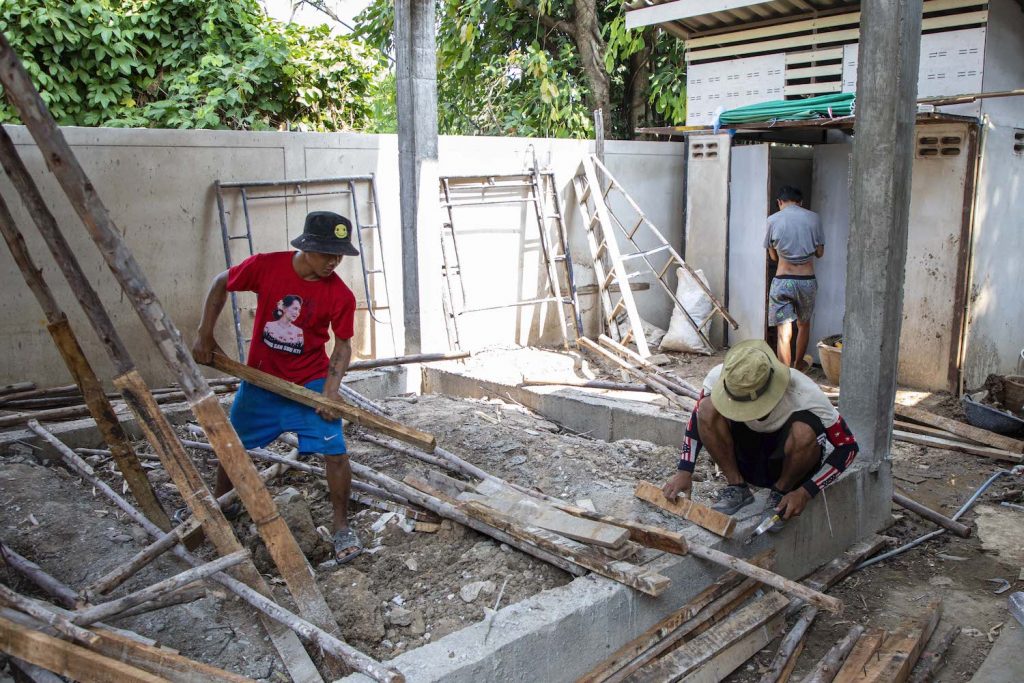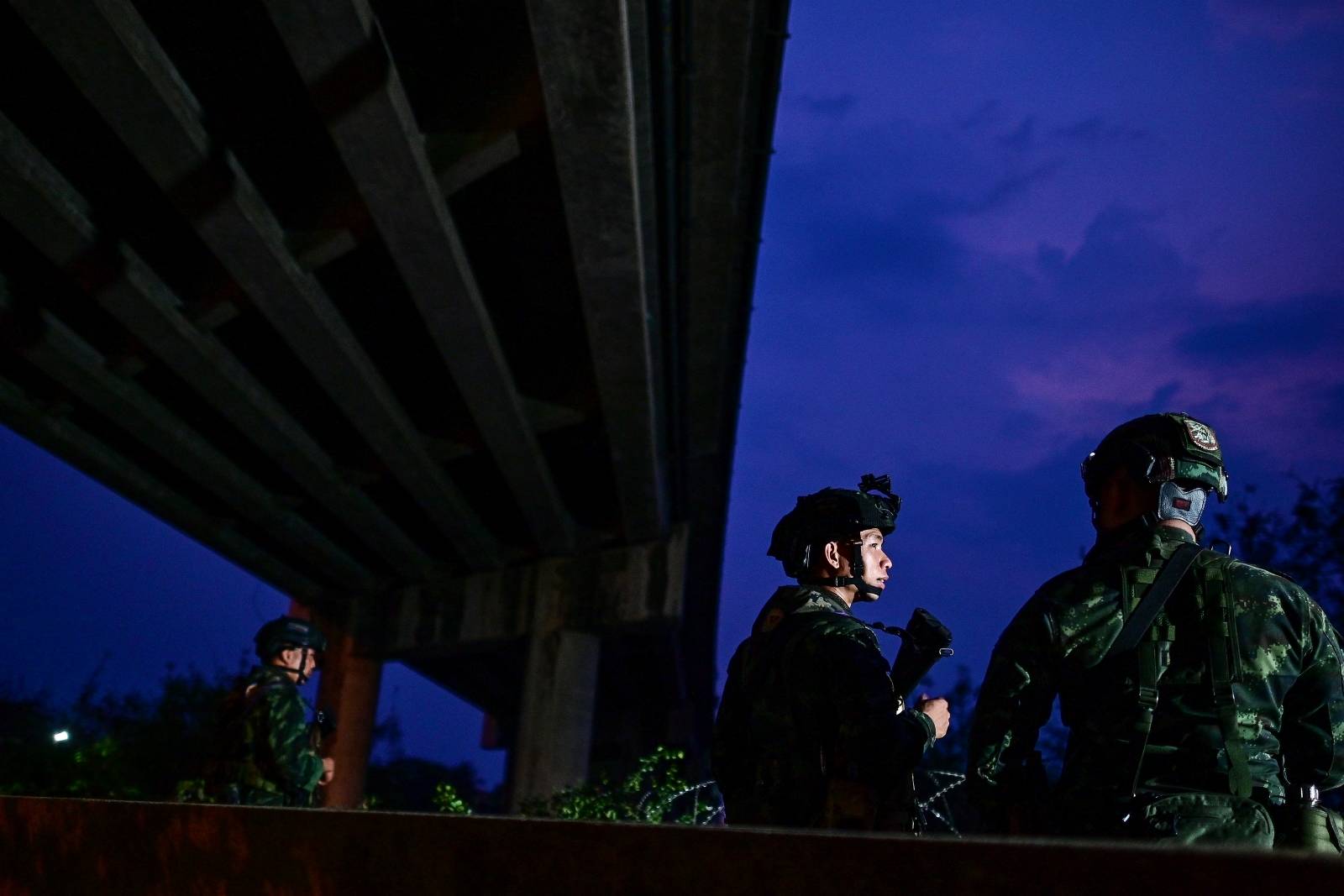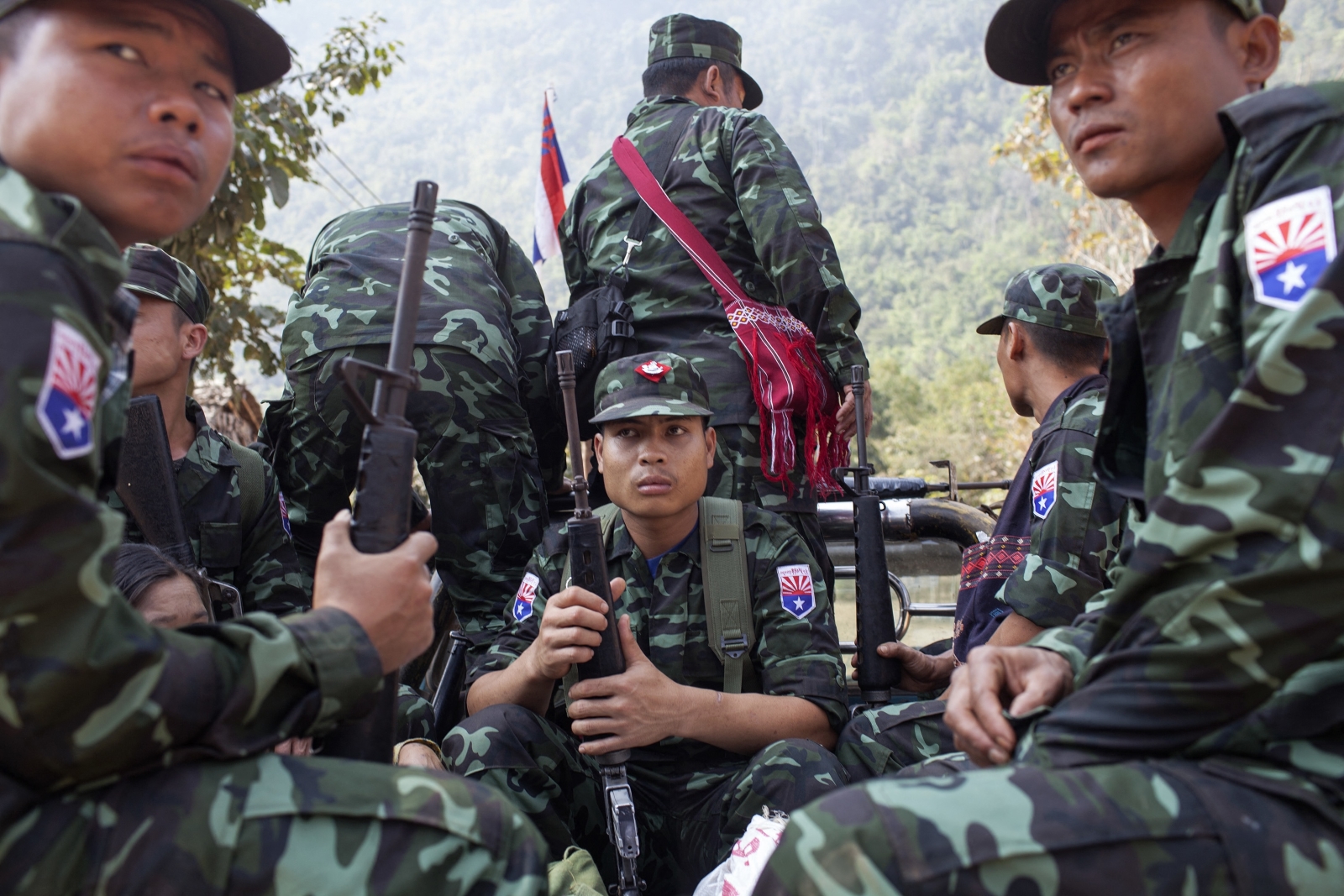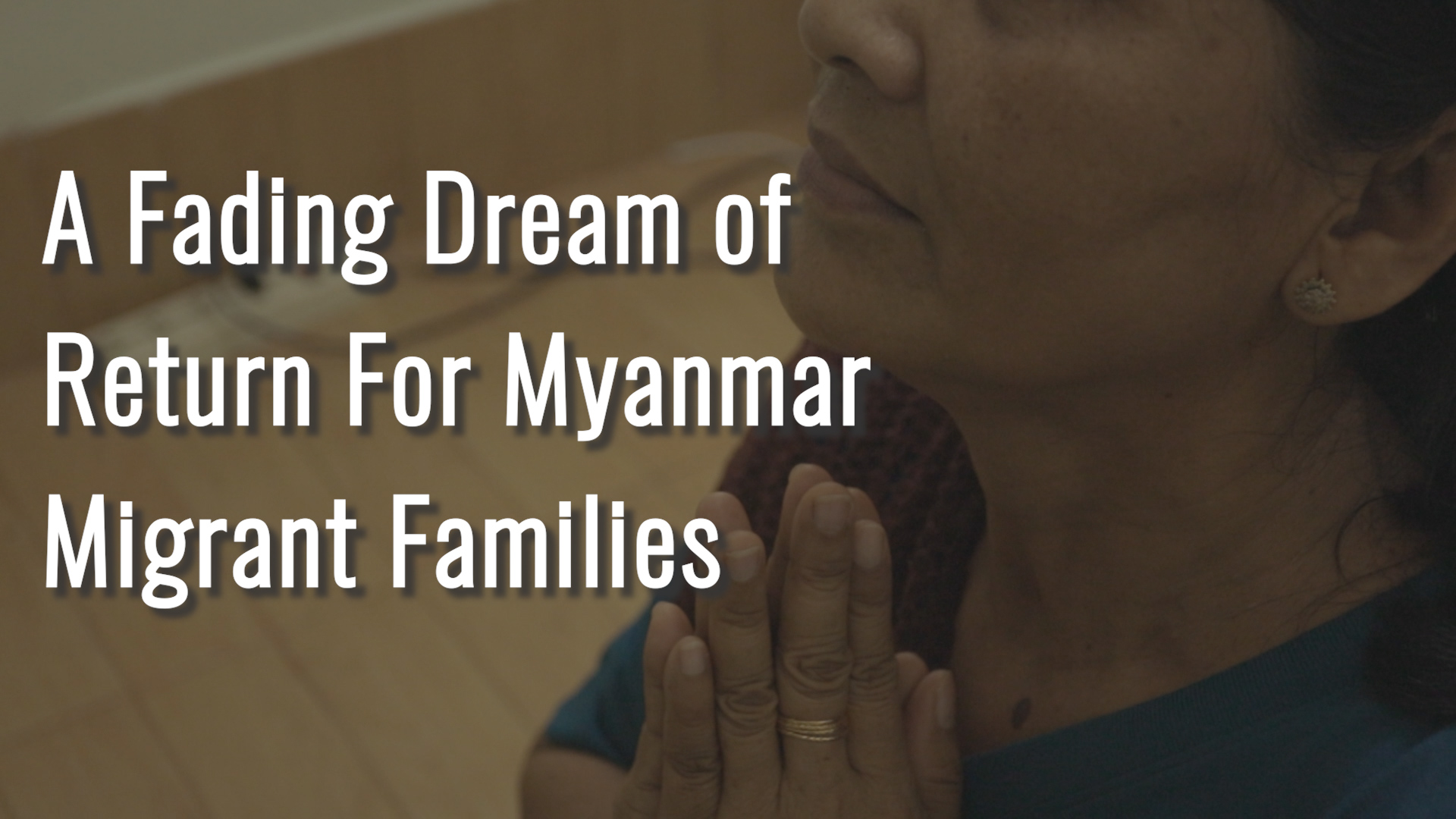Thailand has just reopened its border to Myanmar workers, but a cumbersome application process and deepening poverty continues to push them down illegal paths.
In 2012, while still a teenager, Ma Cho* began walking down the well-worn path from poverty in Myanmar to a life of gruelling work in Thailand. Now aged 25, she left her village home in Ayeyarwady Region’s Pathein Township at 15 and found work on the floor of a factory producing Brand’s Essence of Chicken tonic in Samut Sakhon District (known also as Mahachai) near the Thai capital Bangkok. With her earnings, which far exceeded anything she could get in Myanmar, she was able to send at least K200,000 (US$150) a month to her parents. When the COVID-19 pandemic struck in early 2020, she travelled home to be with them, thinking she’d soon be back working in Thailand.
However, months passed and the border remained sealed, with the Thai government prioritising keeping out COVID-19 over restarting the economy, which heavily depends on the labour of Myanmar migrants. Ma Cho had hoped that legal migration routes would reopen in 2021, but the Myanmar military’s seizure of power in February 2021 prompted a mass walkout by government staff, forestalling the necessary arrangements between Thai and Myanmar authorities.
She said she tried to wait until the border reopened, but grew too desperate. “I eventually decided to take the risk to enter illegally,” she told Frontier. In May last year, she paid a people smuggler to cross into Thailand.
Ma Cho has been unable to get her old life back, however. Before the pandemic, she was a fully documented worker, with the rights stipulated by a 2016 memorandum of understanding on labour migration between Thailand and Myanmar. The benefits of the MoU system (which aren’t always guaranteed in practice) include receiving the Thai minimum wage of 313 baht ($9) a day, social security, and holiday and sick leave. Now undocumented, Ma Cho is waiting for a new permit that will grant her a formal status in Thailand under clemency. This will allow her to get a new job, she says, but without all the same rights, such as the freedom to travel beyond Samut Sakhon.
“I’ve been living here without a job, and it’s difficult to live on my husband’s salary alone,” she said, referring to her partner’s job at a shop for spare car parts.
Ma Cho’s experience is shared by hundreds of thousands of Myanmar migrant workers for whom a trip home during the pandemic has meant falling out of Thailand’s legal migration system and being denied re-entry. The Immigration Bureau of Thailand counted 183,375 Myanmar nationals leaving the country between March 2020 and April 2021, although given the prevalence of illegal border crossings, the true number is likely to be far higher. This compares to an official resident population of almost 1.5 million Myanmar migrants enrolled under a confusing array of registration schemes – of which the MoU system is only one, accounting for a little under 325,000 migrants – according to December 2021 figures from Thailand’s Ministry of Labour. However, with many migrants going undocumented, the true number has been estimated to be as high as 4 million, by far the largest community of Myanmar overseas workers.
Since labour migration exploded in the 1990s, these migrants have been a pillar, not only of Thailand’s economy – doing the menial, low-paid jobs most Thais would refuse – but also Myanmar’s by providing a lifeline to poor, largely rural communities in the country. An International Organisation for Migration report published last year said that, in 2019, migrants remitted $3 billion to the country. However, this is probably an undercount given the continued use of irregular channels such as hundi systems, which were gradually being replaced by mobile money services, until the coup reversed this trend.
The cumulative effect of the coup and COVID-19 was an 18 percent contraction in Myanmar’s Gross Domestic Product in the financial year ending September 2021, as measured by the World Bank, which has projected only a 1pc growth for the current year. In tandem, unemployment has rocketed, with the International Labour Organization estimating 1.6 million job losses in 2021 and an 18pc reduction in overall working hours. The price of basic commodities has also soared. The resulting desperation is driving ever greater numbers of people to Thailand, where a tentative economic recovery from the pandemic is creating more potential jobs for migrants.
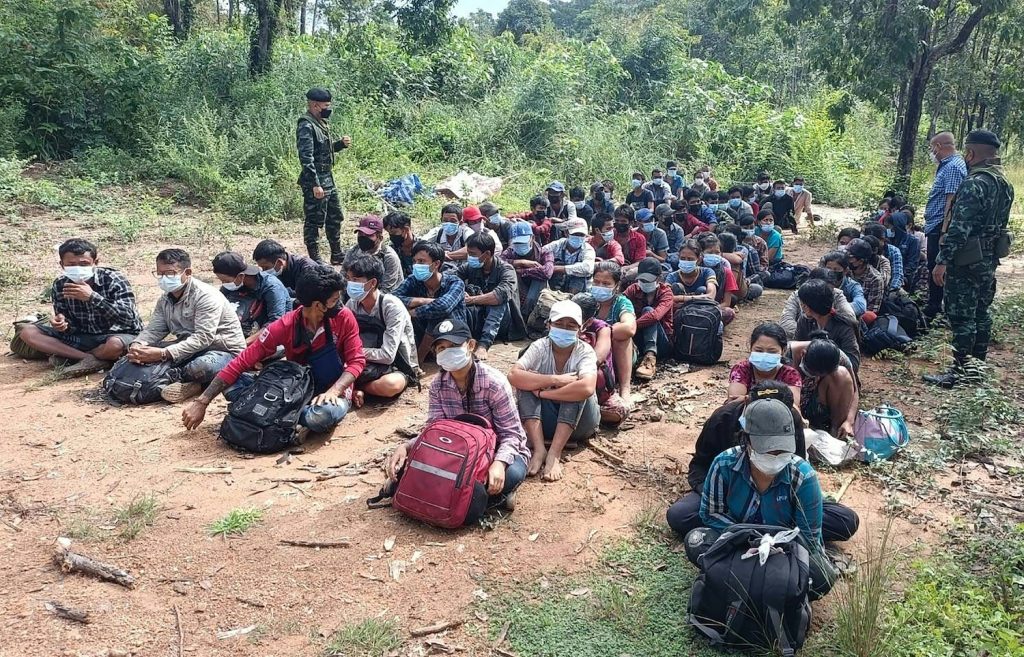
Desperate workers risk fines and deportation
The irregular nature of the crossings in the absence of legal options make the numbers entering Thailand hard to gauge, but one indication is the amount of people being arrested daily at the border by Thai police and soldiers.
Migrant rights activist U Moe Gyo, who chairs the Joint Action Committee for Burmese Affairs in Mae Sot, the border city opposite Myawaddy in Myanmar, said more than 12,300 migrants were caught along the length of the Thai-Myanmar border between January and April this year – a rate of over 100 a day. He attributed the figures to Thai law enforcement officials; although Frontier could not corroborate them, they seem consistent with the deputy national police chief’s announcement in December that his officers had arrested 42,400 migrants for illegal entry in the course of 2021. Given existing migration patterns, the large majority would have come from Myanmar.
Arrests on the border spike on some days, with the interception of migrants crossing in large groups. “In two days [March 11 and 12], more than 700 illegal Myanmar migrant workers were arrested,” Moe Gyo told Frontier.
Those caught face fines of up to 50,000 baht ($1,443) and are deported, with a two-year ban on receiving a Thai work permit. They also lose the fees of between 15,000-30,000 baht paid to brokers before their journey. The fee often includes both an assisted border crossing and a connection to a Thai employer, explained U Moe Kyaw, who directs the Yaung Chi Oo Workers’ Association for migrants in Thailand. The employer is then obliged to help the migrants receive basic documents, often in the form of an informal, locally issued permit. Although they often lack a proper legal basis, these documents offer migrants some protection in the country, so long as they don’t stray far from their workplace. The costs of the process are deducted from their salaries.
However, even among those who manage to evade the Thai border patrols, “many are deceived by brokers without any connection to Thai businessmen,” Moe Kyaw told Frontier. After arriving in Thailand and finding their promised job does not exist, they are often barred from other jobs due to a lack of any documents, he said. To get these documents, they must pay thousands of baht to another broker, in a process that can easily last months. In Ma Cho’s case, it’s been more than a year. The undocumented can often still find some kind of informal work, but this leaves them highly vulnerable to arrest and extortion by police.
Many of these migrants, like Ma Cho, would likely have taken a legal route to work in Thailand if one were available. There have been reports recently, though, of migrants being allowed to enter the country under the MoU system for the first time since the pandemic began. The Thai government, citing a labour shortage, announced in April that it would accept more than 117,000 workers from Myanmar, in addition to smaller numbers from Laos and Cambodia. On May 10, the first group of 287 arrived in Mae Sot. Myanmar state newspaper The Global New Light of Myanmar said they were all bound for a chicken factory, with which they had signed work contracts in March. A second batch of 301 arrived the following day, also with two-year visas and a job ready.
Although this is promising news for migrants who want the protections granted by the MoU, the limited numbers permitted to arrive each day mean they are likely to face a long wait. Myanmar authorities also appear to be mismanaging migrant departures: Daily Eleven reported on May 24 that hundreds of migrants were forced to wait more than a week in Myawaddy to receive passports. But even before this stage, migrants’ travel will be delayed by the need to secure a job beforehand. This happens through a complex bureaucratic process, in which requests from Thai bosses for a certain number of workers must pass through multiple job agents and government departments.
Many are too desperate to wait, as shown by the continued arrest of migrants at the border. This includes a group of 112 caught by Thai security forces on May 14 in a forest in Thailand’s Prachuap Khiri Khan Province, near where they had crossed from Mawtaung in Myanmar’s Tanintharyi Region. The migrants told Eleven Media they had crossed illegally because the MoU process was too difficult and time-consuming.
U Wai Lynn Aung, a former Myanmar labour attaché in Thailand who left the government after the coup to join the Civil Disobedience Movement, said he heard similar justifications from other migrants who have recently crossed into Thailand illegally, and who he has tried to help from behind the scenes.
He told Frontier the Myanmar junta was also trying to earn extra money from migrants, by raising the administrative charge for joining the MoU scheme from K150,000 to K350,000 ($189), although the amount charged by Thailand had also shot up, from 3,600 to between 5,390 ($158) and 7,600 baht ($222), depending on the type of work. An official at the Myanmar Overseas Employment Agencies Federation, who asked to stay anonymous, confirmed these price rises to Frontier, adding that job agents charge up to K200,000 kyat more in unlawful fees to navigate the complex application process.
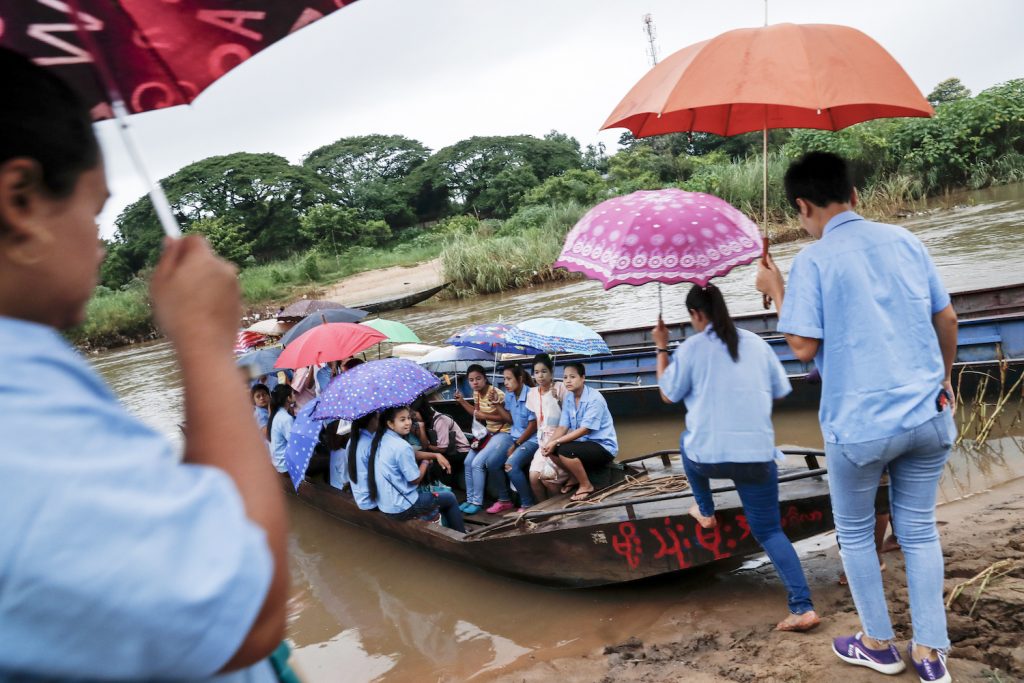
Worsening work conditions
However, even migrants who are settled in Thailand with jobs find themselves in a worse condition than before the pandemic. The owners of factories and other businesses have been trying to restart operations with less money than before COVID-19 wiped out their profits. They are therefore even less likely to be generous with their Myanmar employees or comply with labour laws. The laws are anyway rarely enforced: according to Thailand’s labour ministry, there were 1,889 labour inspectors in 2019 for a national workforce of 22 million people. Worsening conditions in Myanmar, meanwhile, give migrants little choice but to accept poorer treatment.
“Thailand knows about the situation in Myanmar so they don’t look after Myanmar migrant workers,” said factory worker Ko Zarni, suggesting that many employers are taking advantage of migrants’ desperation. He said the shoe factory he works at in Bangkok’s Khlong Sam Wa district has 500 workers, all of whom used to be Myanmar migrants under the MoU system. “But now, because so many migrant workers are coming to Thailand illegally, they mostly use illegal workers,” he told Frontier. Their illegal status means the management can give them lower wages and fewer benefits.
However, Ko Zarni said he is also deprived of his rights, despite being one of the few workers at the factory to have a work permit under the MoU system. He is made to work overtime without compensation, he said, and is only paid for the days he works, with no sick or holiday pay. Ko Zarni said the lack of sick leave had been a particularly costly problem during the pandemic, when COVID-infected workers have had to isolate for long periods away from their workplaces while going unpaid.
Frontier could not verify Ko Zarni’s claims, but Daw Thuzar Kyaing, a legal officer at the Yaung Chi Oo Workers’ Association, said even stricter COVID-19 regulations were applied in some factories in Mae Sot. Migrant workers are only allowed to leave the premises of their factories on public holidays and in special circumstances, she said, and were charged 300 baht for a COVID-19 test on their return. If they test positive, they must take a week off without pay.
At the same time, migrants have to work longer to provide their families back home with the same level of support as before the coup. This is because the military takeover precipitated a slow-motion banking crisis in Myanmar, in which depositors rushed to withdraw whatever cash they had in their accounts, fearing banks would collapse amid the instability. The resulting cash crunch and day-long queues at ATMs, which often ran out of money altogether, spawned a new industry of cash brokers. These brokers often include bank staff themselves, who give people timely access to their money in exchange for a cut. Withdrawals from mobile money agents similarly come at a price.
The informal withdrawal fees have decreased in recent months – down from 4-7pc to about 2.5pc – as the Myanmar banking system has stabilised somewhat, but they are still eating away at the money that migrant families can receive. “In the past, the amount you sent was the same as what’s received at home,” said Moe Kyaw of the Yaung Chi Oo Workers’ Association. “But now, you must send more. To do that you have to work more here or economise and cut what you spend.”
Meanwhile, some migrants who have spent decades in Thailand have been pushed out of the workforce by pandemic-induced layoffs and an influx of new, younger Myanmar workers, who are filling the jobs created by Thailand’s gradual economic recovery. “There are fewer and fewer jobs for people our age,” said U Kyaw Zayar, 45, who is from Thaton Township in Myanmar’s Mon State but has spent most of his working life in Mae Sot. “Our factory shut down and no new jobs in the sector could be found, so I began to seek out casual day work,” he told Frontier.
Kyaw Zayar has cut his living costs, and now shares his 1,200 baht-a-month apartment with several other migrants. However, he said, “I still need to send money back home for my sons,” who are aged 12 and 19, “so I have to find money through all possible means. Today, I could earn only 90 baht.”
Some migrants are in an even bleaker position. Forty-five-year-old Daw San Aye, from Paung Township in Mon State, was also laid off by her textile factory when COVID-19 struck Mae Sot. Her husband took up informal, menial jobs around the city to support her and their two sons, aged nine and 14, who lived with them in Mae Sot, but he died from kidney disease late last year. “Now that he’s gone, our family income is gone,” she said. “I am too old to get factory jobs. My elder son’s school fees are waived by his teachers. Our family is living on charity from friends and acquaintances.”
However, for San Aye, going home is not an option. “I came to Mae Sot when I was just 18 years old, so I don’t know anyone in Myanmar now,” she said. “I must be prepared to die here.”
* Ma Cho is a pseudonym. Her real name is being withheld because of her immigration status.


